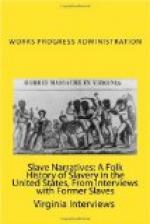Dey be on’y one sto’ here when I come to Tampa. Hit b’long t’ ol’ man Mugge. Dey be a big cotton patch where Plant City is now. I picked some cotton dere, den I come to Tampa, an’ atter a while I got a job nussin’ Mister Perry Wall’s chillen. Cullud folks jes’ mek out de bes’ dey could. Some of ’em lived in tents, till dey c’d cut logs an’ build houses wid stick-an’-dirt chimbleys.
Lotta folks ask me how I come to be called “Mama Duck.” Dat be jes’ a devil-ment o’ mine. I named my own se’f dat. One day when I be ’bout twelve year old, I come home an’ say, “Well, gran’mammy, here come yo’ li’l ducky home again.” She hug me an’ say, “Bress mah li’l ducky.” Den she keep on callin’ me dat, an’ when I growed up, folks jes’ put de “Mama” on.
I reckon I a heap bettah off dem days as I is now. Allus had sumpin t’ eat an’ a place t’ stay. No sech thing ez gittin’ on a black list dem days. Mighty hard on a pusson ol’ az me not t’ git no rashuns an’ not have no reg’lar job.
FEDERAL WRITERS’ PROJECT American Guide, (Negro Writers’ Unit)
Pearl Randolph, Field Worker
Madison, Florida
January 30, 1937
WILLIS DUKES
Born in Brooks County, Georgia, 83 years ago on February 24th, Willie[TR:?] Dukes jovially declares that he is “on the high road to livin’ a hund’ed years.”
He was one of 40 slaves belonging to one John Dukes, who was only in moderate circumstances. His parents were Amos and Mariah Dukes, both born on this plantation, he thinks. As they were a healthy pair they were required to work long hours in the fields, although the master was not actually cruel to them.
On this plantation a variety of products was grown, cotton, corn, potatoes, peas, rice and sugar cane. Nothing was thrown away and the slaves had only coarse foods such as corn bread, collard greens, peas and occasionally a little rice or white bread. Even the potatoes were reserved for the white folk and “house niggers.”
As a child Willis was required to “tote water and wood, help at milking time and run errands.” His clothing consisted of only a homespun shirt that was made on the plantation. Nearly everything used was grown or manufactured on the plantation. Candles were made in the big house by the cook and a batch of slaves from the quarters, all of them being required to bring fat and tallow that had been saved for this purpose. These candles were for the use of the master and mistress, as the slaves used fat lightwood torches for lighting purposes. Cotton was used for making clothes, and it was spun and woven into cloth by the slave women, then stored in the commisary for future use. Broggan shoes were made of tanned leather held together by tacks made of maple wood. Lye soap was made in large pots, cut into chunks and issued from the smoke house. Potash was secured from the ashes of burnt oak wood and allowed to set in a quantity of grease that had also been saved for the purpose, then boiled into soap.




